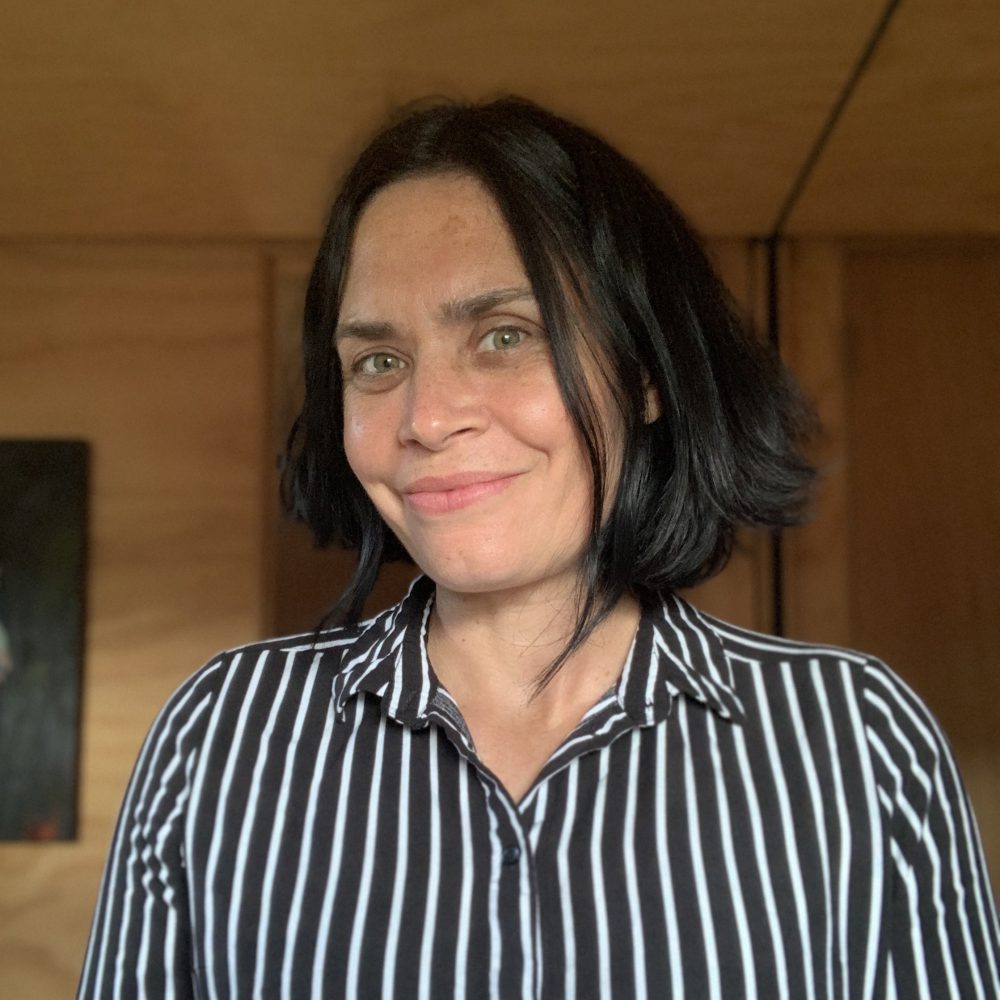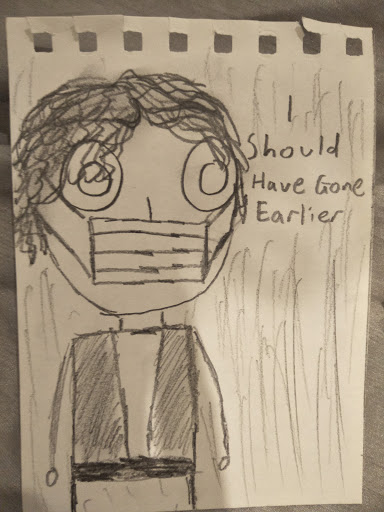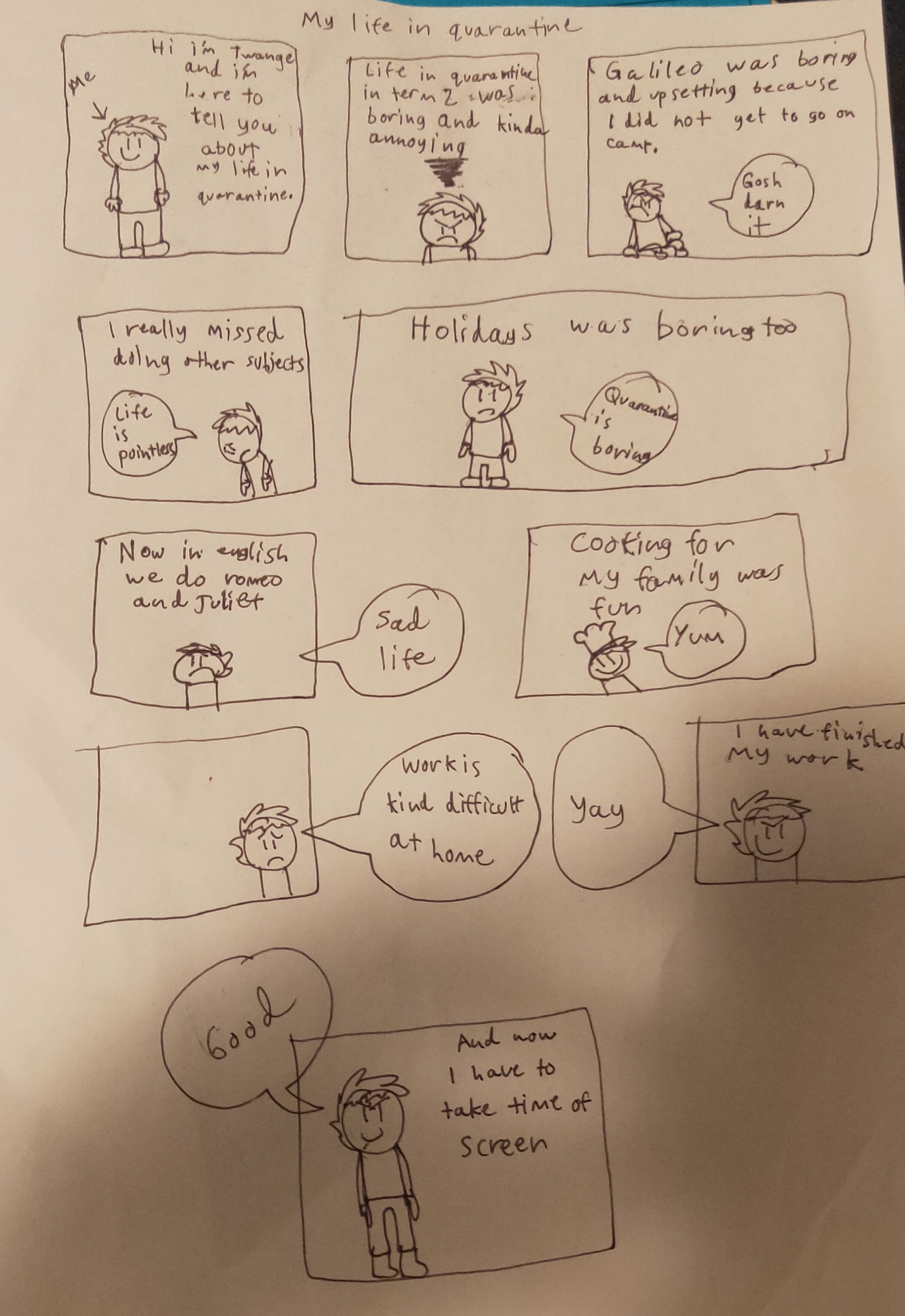Written Up!
As part of the Write Up Digital Workshop Series, students produced autobiographical comics, screenplay scripts, poetry, and self-writing.

Student Responses
to
Autobiographical Comics with Mandy Ord (Write Up Workshop Series)
The Creative Prompt

Make an autobiographical comic!
The key to making comics is to take what you already know but to also learn as you go.
Mistakes and making decisions are the quickest ways to learn. Making discoveries is the exciting part about drawing comics. Be in the moment and really enjoy living in the world of the story. Trusting in your intuition, your gut feeling. It’s fun and a lot of work and it’s worth it.
Student Pieces

Mandy's Feedback
I love comics. What can I say but to admit that I think and dream about them all the time. So it was with great excitement that I had the opportunity to read new comics created by the students of the Stella Prize Digital Write Up Series.
I was struck by the diversity of distinct, fresh voices and the unique approach each student took to telling their stories with comics. Evident in each piece was a clear willingness and open-minded approach to trying something new. Creating and sharing the results of this experimentation and discovery is a truly generous act on behalf of each student. I understand and appreciate the time and effort that goes into creating the work and the results speak for themselves.
The choice of subject matter offered a meaningful insight into the lives of each student and the complex times we are all living in. With well thought out concepts, clarity and humour each student managed to transform their unique and personal experience of being in the world into something that also resonated as relatable and universal. Their warmth and insight was unmistakable.
I was pleased to see in the range of work an understanding of the language elements that are unique to comics. The elements that stood out were bold eye-catching titles, clear and effective uses of narration and speech, well placed word and image juxtaposition, strong use of facial expressions and body language, thoughtfulness in composition and timing, and well chosen background details in panels. It was exciting to see the ways the students chose to depict themselves as the characters in their stories and I just loved the use of animals as representations of the symbolic self.
Through their comics each student demonstrated their distinct writing and visual styles as well as knowledge of their subject matter. As a reader and a comic fan I came away from each story feeling like the world as I knew it has just opened up to me that much more. Thank you and well done. Please keep drawing comics!!!! 🙂
Student Responses
to
Writing for performance with Vidya Rajan (Write Up Workshop Series)
The Creative Prompt

A monologue which explores the theme of ‘Surveillance – Who Am I If Nobody is Looking?’
– Include stage directions for the performance
– Have a sense of a Beginning, Middle and End
– Show evidence of drafting, editing and crafting into shape
Student Pieces

Vidya's Feedback
It was wonderful to read such a range of pieces centred around the prompt of ‘Surveillance – Who am I when Nobody is Looking?’
All pieces demonstrated a clear understanding of the speaking voice that is central to performance and the monologue form. In some, the ‘I’ was a version of the writer, while in others the ‘I’ morphed into other characters, even across time periods from medieval times to aliens. Across these though, there was no doubt that the speaking voice was deeply felt and declarative. Students seemed very aware of the crucial fact that an audience is required for performance, and there was a sense that all their characters were addressing one. Particularly impressive were the use of stage and performance directions across the group – they were correctly formatted, but more importantly they added to the sense of drama, rhythm and character in the pieces.
Related to this, and one of the key demands of this form, that students have picked up on is a sense of movement. Pieces displayed an awareness that they had to start and end in different places emotionally and tonally. This sense of a journey is not easy, and all work displayed solid attempts at creating those shifts. The shifts particularly sung out when they were accompanied by detail and the use of a revelation towards the end of the monologue.
Many monologues displayed a talent for visceral language about the feelings of the characters, which can be key in writing for performance – you could really see how affecting it would be to see a body on stage talking about themselves with such emotion. It was also delightful and a privilege to hear the truth in many of these pieces – students were writing from themselves, even through character, and the confessions and insights they shared revealed something of their fears, hopes and preoccupations in a raw and engaging way.
Student Responses
to
Writing Self-Care with Evelyn Araluen (Write Up Workshop Series)
The Creative Prompt

How can you use your writing as self-care?
- Write an answer to the question: how are you?
- Write a letter to someone you’re worried about.
- What’s your favourite song lyric or quote? Pretending it’s yours for a moment, create a short piece of writing with that line.
- Using the prompt “Let me explain”, write a monologue. Imagine it’s addressed to someone in the future.
- Write something kind to someone.
Student Pieces

Evelyn's Feedback
What a privilege and an honour to read this beautiful selection of pieces. There’s so much variation in form, style, voice and technique at work here. What I love to see is the range of responses which have come out of the writing self-care exercises. Some pieces seem to be crafted in direct conversation with themes and practices introduced in the workshop, while I can see others have taken very individual approaches to this topic and drawn out their own ideas and possibilities. Each piece is best assessed by what it does for you as a creator – is this something you feel nourished and enriched by when you return to it?
I loved reading Used to this and seeing how Sally has explored the possibilities sparked by a favourite song to construct a new narrative through which to imagine connections. While this piece is dark, it’s important to emphasise the role of angst in your own process: working through feelings in an imaginative sense gives us perspective, and allows us to explore aspects of our emotions we don’t always encounter in the everyday. This is an excellent example of how self-care doesn’t always look like utopia.
Similarly, I had a great time reading RE: Dear Icarus, which mixed a few forms, but I think is best read as an apostrophe – a speech directed to someone that we as the reader are not aware of. I feel like this piece combined literary ambiguity with the suggestion of a mythological history, and I love that kind of play. That’s exactly what writing self-care is all about! Writing without too much fear of constraint. This piece didn’t expressly narrate the emotions of the composer, but rather crafted a series of beautiful metaphors and images through which to externalise some of those feelings. It’s a great and imaginative response.
This winter is going to last/a lifetime I am told/or How I want to remember 2020 was such a creative and detailed piece that I’m pretty confident it comes from a broader project of Pen’s. This piece reads like an excerpt or snippet of a fun, intertextually rich dystopian novel, and the interweaving of the song had a really beautiful effect. It’s great to see young writers engaging so directly with inspiration and with structural devices in their work. I feel like the self-care that came out of this piece was the feeling of escape and possibility that comes from such a richly detailed piece of work. I hope you keep writing this!
I had such a nice time reading I Dream of Summer. It was so lovely to read a poem with such a balance of introspection and embodiment. I loved some of your images, especially those in the last stanza. There’s so much subtle suggestion in this. I feel like this piece was inspired by the discussion around how we can write to future and past selves and places to show how we value and cherish certain memories, so this was a tender piece to read.
Andre’s Glass is the classic balance of form and subject, and I can really see where this piece plays out the internal dilemmas of self-care. I love the metaphor/metonym you’re using here of the pretty object which gives us a sense of joy and pleasure, but which we know is entangled in complex world problems. You stage all of the questions and challenges without necessarily answering them, which is, I think, the value of this kind of introspection. I love that this poem is shaped like a vase as well! A great touch.
I had such a lovely time reading these responses. I hope they brought you joy and an opportunity to connect with your own reflections as you composed them.






